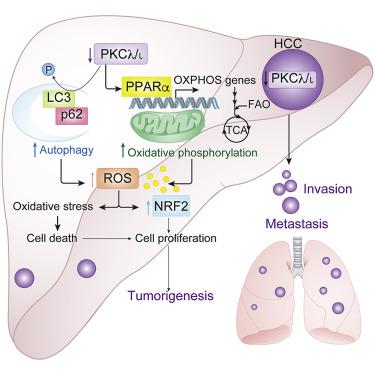Cancer Cell ( IF 50.3 ) Pub Date : 2020-06-25 , DOI: 10.1016/j.ccell.2020.05.018 Yotaro Kudo 1 , Masayuki Sugimoto 2 , Esperanza Arias 3 , Hiroaki Kasashima 1 , Thekla Cordes 4 , Juan F Linares 5 , Angeles Duran 5 , Yuki Nakanishi 1 , Naoko Nakanishi 1 , Antoine L'Hermitte 1 , Alex Campos 1 , Nadia Senni 1 , Tarmo Rooslid 1 , Lewis R Roberts 6 , Ana Maria Cuervo 3 , Christian M Metallo 4 , Michael Karin 7 , Maria T Diaz-Meco 5 , Jorge Moscat 5

|
Oxidative stress plays a critical role in liver tissue damage and in hepatocellular carcinoma (HCC) initiation and progression. However, the mechanisms that regulate autophagy and metabolic reprogramming during reactive oxygen species (ROS) generation, and how ROS promote tumorigenesis, still need to be fully understood. We show that protein kinase C (PKC) λ/ι loss in hepatocytes promotes autophagy and oxidative phosphorylation. This results in ROS generation, which through NRF2 drives HCC through cell-autonomous and non-autonomous mechanisms. Although PKCλ/ι promotes tumorigenesis in oncogene-driven cancer models, emerging evidence demonstrate that it is a tumor suppressor in more complex carcinogenic processes. Consistently, PKCλ/ι levels negatively correlate with HCC histological tumor grade, establishing this kinase as a tumor suppressor in liver cancer.
中文翻译:

PKCλ/ι 丢失诱导自噬、氧化磷酸化和 NRF2 以促进肝癌进展。
氧化应激在肝组织损伤和肝细胞癌 (HCC) 的发生和进展中起着关键作用。然而,在活性氧 (ROS) 生成过程中调节自噬和代谢重编程的机制,以及 ROS 如何促进肿瘤发生,仍然需要充分了解。我们表明肝细胞中的蛋白激酶 C (PKC) λ/ι 损失促进了自噬和氧化磷酸化。这导致 ROS 生成,其通过 NRF2 通过细胞自主和非自主机制驱动 HCC。尽管 PKCλ/ι 在癌基因驱动的癌症模型中促进肿瘤发生,但新出现的证据表明它是更复杂致癌过程中的肿瘤抑制因子。始终如一地,PKCλ/ι 水平与 HCC 组织学肿瘤分级呈负相关,


























 京公网安备 11010802027423号
京公网安备 11010802027423号